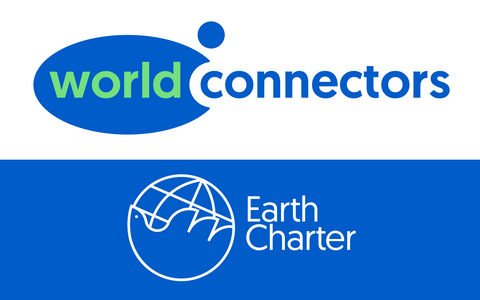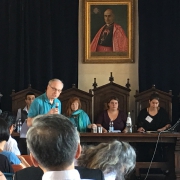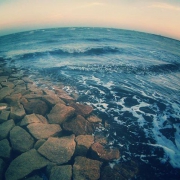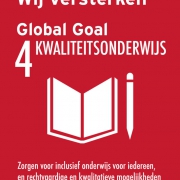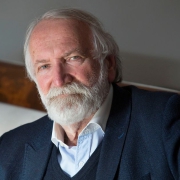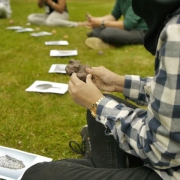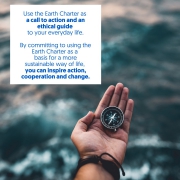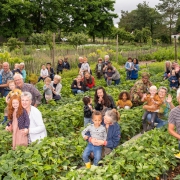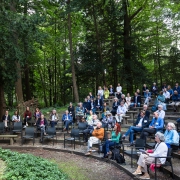Sherlien Sanches: Ecology, Spirituality and Indigenous Philosophy
Sherlien Sanches participated in a conference on Spirituality and Sustainability. The Earth Charter was an important inspiration of the program which took place in June-July 2017 in Rome and Assisi. Read her account in which Sherlien reflects on the connections between ecology, spirituality and indigenous philosophy.
Ecology, Spirituality & Indigenous Philosophy
A group of academic leaders and representatives of the Earth Charter network from different parts of the world assembled for the second part of the conference on Spirituality and Sustainability which took place in Assisi. The first part of the conference had already taken place in Rome the days before. I was fortunate to join the group – as representative from Earth Charter The Netherlands – in Assisi. Assisi, the beautiful city of St. Francis where art, religion and history meet and where the Middle Ages seem to come alive.
At the conference, we focused on global ethical values and perspectives, and the question how we can connect Earth ethics with spiritual ethics. As we proceeded and the integration of Earth Charter principles in policies and practices was discussed, I couldn’t stop thinking about the contradictions between religion and native spirituality.
My mother is from the Kalina people, a native tribe in Surinam. These indigenous people in Surinam are still resident in the Amazon of South America today. Visiting Surinam – coming from The Netherlands where I was raised – I have experienced how evangelists try to demonize the indigenous spirituality by saying that the native believes are pagan! It felt a bit ironic to be in Assisi talking about integrating indigenous philosophy while on the other side of the world religion and the indigenous spirituality don’t always blend. It seems that there are several groups dedicated to the Christian and Catholic church, but they act apart from each other at different locations.
But then I learned in Assisi about the teachings of Thomas Berry which gave me more insight, understanding and hope towards a new vision for our Earth Community.
Thomas Berry teachings
Thomas Berry was a Passionist priest, a leading cultural historian and ‘geologian’. He was one of the 20th-century’s most probing thinkers on the human relationship with the natural world and its implications for religion. Rather than a theologian, Berry considered himself a cosmologist and ”geologian,” an Earth scholar. He believed the only way to effectively function as individuals and as a species is to understand the history and functioning of our planet and of the wide universe itself. A sense of wonder is the therapy for our disconnection from the natural world.
Berry was critical about modern academia and institutionalized religion. He concluded: “the difficulty is that humanistic and religious traditions themselves are largely responsible for the situation that has evolved.” Berry indicated that failures of imagination and vision are to be found not only in the “humanistic-religious traditions,” but also in the practices and policies of our major institutions and professions.
All four—the political, religious, intellectual, and economic establishments—are failing in their basic purposes for the same reason. They all presume a radical discontinuity between the nonhuman and the human modes of being, with all the rights and all inherent values given to the human.
Laid out here is the fundamental link Berry sees between our current political and economic situation and the major failures of our received wisdom traditions. Knowledge without wisdom is dangerous.
Education & Indigenous Philosophy
As we proceed talking about higher ethical standards, one of the indigenous participants of the conference talked about our linguistic barriers. She said that from a native perspective it is weird that WE in the West separate the word ecology from spirituality. Because for the indigenous people these two words belong together as ONE. Indigenous ceremonies and rituals are not possible without the plants, trees and herbs.
Underneath a field of olive trees, we experienced beautiful indigenous ceremonies and meditation. At that moment, we felt as one with each other and with Earth and all her natural treasures. I realized that indigenous philosophy is necessary and crucial to reconnect our minds with Earth energy and to break away from the materialistic mind.
Therefore, we also need to move institutions towards the paradigm of sustainable education. With the Earth Charter as a foundation we can use it as a guide towards sustainable education & indigenous philosophy.
The Journey of the Universe
At the Italy conference the educational documentary “The Journey of Universe” was viewed and discussed. In The Netherlands we had experienced how powerful the documentary is with its holistic message of one human community. It is a perfect match between a scientific and holistic perspective, and so approachable for every person of any religion or age. A must-see documentary.
Guardians for future Generations
We also talked about the need of appointing guardians for future generation in every country. This ombudspersons will directly contribute towards the implementation of SDG 16 regarding inclusive institutions. The mindset to involve future generations in policy making will immediately have an effect on all 17 sustainable development goals. The sooner we involve the interests of future generations and young people in policy making, the better. All policies should be checked against effects and costs in the future, in order to prevent us constantly being overtaken by unfortunate events with negative effects.
The voice of the Youth
The youth present at the conference in Assisi had some powerful messages about consumerism and decolonization.
Consumerism & Materialism
They pointed out that we must be aware of the power of advertising and creating materialistic minds. We are spoiling our kids with too much stuff that they don’t need. Everyone knows that we live in a culture of consumerism. But few people understand the full extent of the problems it causes or the effects that it has on each of us and on our environment. Recycling has its limits. But so, does our Earth. We have a garbage crisis and need to learn to reduce and reuse. Use less stuff.
Decolonize our education
Which regenerate Indigenous knowledges, epistemologies, and ways of life. Decolonization of education is needed and it is up to each of us to take up the recognition of Indigenous sovereignty and what the risks and responsibilities of this recognition mean. I came to realize all the more that we need to move away from a white supremacist value system that tells us whose knowledge is valuable and how it should be shared. We want to move towards one in which the complexity and diversity of knowledge is embraced and accounted for. This must come along with shifts in practices and attitudes to education that actively dismantle the colonial roots and history of bias that play their way into the current system. Solutions going forward will come in the form of necessarily slow but continual change.
We were all touched by the compounding insights of the youth.
With my indigenous background and my involvement with the Earth Charter I can focus on making a deeper connection between the Earth Charter and the unique relationship Indigenous people have with natural systems between Earth & Spirit. Let us all work towards recognition and preservation of the native language, culture and spiritual wisdom.
Therefore, we need to ask ourselves if we dare to address compelling and urgent questions facing indigenous communities as they struggle with threats to their own sovereignty, increased market and media globalization, and the conservation of endangered bio regions, like Thomas Berry did. It is time to begin debate to avoid extinction of the best stewards of the environment bestowed upon mankind by the almighty.
We are here to take care ……. Not to take over!
We cannot go forward with just science and politics and business, we need spiritual guidance to build cultures of life.
Thank you, Assisi, <3
Sherlien Sanches
Have a look at Sherlien’s profile as Earth Charter Friend on this website.
